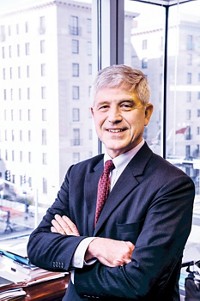Advertisement
Grab your lab coat. Let's get started
Welcome!
Welcome!
Create an account below to get 6 C&EN articles per month, receive newsletters and more - all free.
It seems this is your first time logging in online. Please enter the following information to continue.
As an ACS member you automatically get access to this site. All we need is few more details to create your reading experience.
Not you? Sign in with a different account.
Not you? Sign in with a different account.
ERROR 1
ERROR 1
ERROR 2
ERROR 2
ERROR 2
ERROR 2
ERROR 2
Password and Confirm password must match.
If you have an ACS member number, please enter it here so we can link this account to your membership. (optional)
ERROR 2
ACS values your privacy. By submitting your information, you are gaining access to C&EN and subscribing to our weekly newsletter. We use the information you provide to make your reading experience better, and we will never sell your data to third party members.
Business
Reflecting on a Life in Chemicals
Visionary strategy brings former BASF Chairman Strube the Palladium Medal
by PATRICIA L. SHORT, C&EN LONDON
May 23, 2005
| A version of this story appeared in
Volume 83, Issue 21

When Jürgen F. Strube became chairman of BASF's board of executive directors in 1990, some eyebrows were raised. He was a lawyer, not a chemist, and the appointment was seen as a startling break with tradition at the venerable German chemical giant.
But when he retired from that position in 2003, to "move upstairs" as chairman of the BASF supervisory board, it was clear that BASF had successfully staked a claim: It was "the chemical company," a phrase the firm later adopted as its tagline. Strube and his team ignored a decade of pressure from the financial community to follow the fashion of splitting up and focusing on only a few businesses. As a result, BASF is one of the few examples remaining of an integrated chemical company with broad activities.
It is for charting that strategy, and his role in building BASF into one of the top global chemical companies, that Strube will be presented with the Palladium Medal of the American Section of the Société de Chimie Industrielle at a gala dinner in New York City this week.
This medal is the latest in a string of awards and honors for Strube over the past decade, ranging from an honorary doctorate from the University of Maryland's University College, to the Centenary Medal of the Society of Chemical Industry in London, to the Order of Merit, 1st Class, of the Federal Republic of Germany.
Strube, 65, obtained his doctorate in law in Munich in 1967, passed the German national examination in law a year later, and joined BASF's finance department in 1969. His first international assignment was at the company's complex in Antwerp, Belgium, and in 1974, he was sent to BASF Brasileira in São Paulo. During his nearly 10 years in Brazil, he worked in staff functions, then in line activities, finally rising to president of the Brazil division in 1982.
In 1985, Strube was appointed a member of BASF's board of executive directors, based in the firm's offices in New Jersey. He returned to Germany full-time in 1988 and became the head of the company in 1990.
BASF's sales that year were $17.1 billion, and the company was number one in C&EN's global Top 50 ranking. Nearly 15 years on, the company's 2004 sales were $46.7 billion. Preliminary analysis of 2004 results in the global chemical industry indicates that, when the company's sizable oil and gas revenues are stripped out, BASF's remaining chemical sales of $37.5 billion will put it just behind Dow Chemical as the world's second largest chemical maker.
IN ADDITION to his current position as chairman of BASF's supervisory board, Strube is president of the Union of Industrial & Employers' Confederations of Europe (UNICE), a pan-European employers' group. He relinquishes that post this summer after a two-year stint.
The UNICE post capped a variety of extracurricular activities, both in Germany and internationally. He was a cofounder in 1998--with Reinhard Mohn, chairman of the Bertelsmann Foundation, and Hubertus Schmoldt, chairman of Germany's Mining, Chemical & Energy Industrial Union--of the German Employment Initiative, the country's largest single project to create and secure jobs in German industry. And he was deputy chairman of the German Science Foundation from 1998 to 2004.
It was at a relatively quiet time when he met with C&EN to talk about his life in the chemical industry and how it has changed over the decades. The conversation was held in an executive-floor meeting room at BASF's Ludwigshafen, Germany, headquarters, resplendent with Chinese scroll paintings, carvings, and other mementos of the various investments that BASF has embarked upon in China.
Strube is in an ebullient mood, the day after the company's annual meeting, which, he observes, lasted "only" five hours. "That is not a record--last year, it was four hours, 40 minutes," he points out. Such brevity is unusual. Annual meetings of German companies have been known to go on well into the evening from an early-morning start. But BASF has been posting good results, and he and Chairman Jürgen Hambrecht did not have to field many awkward questions or hostile proposals from shareholders.
From his vantage point on the supervisory board, Strube is able to offer some explanation of the differences in roles between the supervisory and management boards commonly found in Germany and elsewhere in Europe.
The dual board system arose, he explains, to enhance the checks and balances between management on the one hand and shareholders and employees on the other. In the U.S., companies have a one-tier board system, with the same person functioning as CEO and chairman of the board, he observes, in roughly 70% of all companies. But in Germany, public companies have a two-tier system. Moreover, in any company with more than 2,000 employees, the supervisory board must be split evenly between shareholder and employee representatives.
As Strube describes it, the management board is responsible for developing and implementing the strategy of the company. The supervisory board, as the name indicates, provides overall strategic guidance. Because its duties include nominating members of the management board--including its chairman--the supervisory board "must also participate in development of the second-level managers, who can become members of the management board," he points out.
In France, the Netherlands, and Switzerland, Strube notes, legislation leaves the decision of combining or splitting the roles of chairman and CEO up to each company to make. "It is important," he stresses, "not to insist that 'one size fits all' " with one system imposed on all companies. "This 'one size fits all' concept is not helpful, particularly because companies pass through different stages and sometimes need different structures. Governments should give companies choices in how to resolve the challenges they can face."
Many of his conclusions about the state of European corporate governance come from his extensive international experience. These days Strube seems to be one of the few chemical industry leaders willing to enter the public spotlight. In turn, that unwillingness on the part of its executives exacerbates the dwindling impact of the chemical industry itself.
"The chemical industry is not perceived by political decisionmakers as a pillar industry," Strube concedes. He offers several reasons as to why this situation has developed.
"Many products and services of the chemical industry are taken for granted--they are just part of our world. Some important breakthroughs came in the 1960s-70s. So now, people don't pay as much attention to the industry as it deserves," he says. And because the industry is taken for granted, it has become more open to criticism from outsiders.
Another reason lies in the globalization of the chemical industry. "We said good-bye to the strategy of diversification, as it became mandatory to focus on our core competencies," Strube observes. "That has led to the demise of many integrated chemical companies. In the 1990s, there were dramatic changes in the scope of the chemical industry. Bellwether names--Union Carbide, ICI, Hoechst, Rhône-Poulenc--either were absorbed or broken up."
That, in turn, has changed the outside perception of the industry, he adds. People no longer talk about "the chemical industry," he suggests. "Now, people talk about pharma, petrochemicals, fine chemicals, textiles dyes industry, and so on. There is a multitude of sectors and companies. You see specialized companies with specialized industries, and each has different needs. There is a mosaic of companies representing the chemical industry." One result is that "it is more and more difficult for the chemical industry to present a coherent argument for its contribution to society."
THE INDUSTRY, Strube argues, needs to explain better what it is doing and how it is "indispensable" to the world.
He recounts his experience as president of UNICE, where he speaks to executives in other industries about the European Union's proposed chemicals management program, Registration, Evaluation & Authorization of Chemicals (REACH). "I ask them, 'Do you use chemicals?' The answer is usually, 'No.' Then I ask them, for example, 'Do you use lubricants?' 'Yes, of course,' may come the answer. When I then ask if those are 'identified uses' permitted by REACH, and that if not, the person will no longer be able to use x, y, or z," people begin to understand the potential impact of the legislation.
A recent study on REACH's impact on downstream industries, published by consultants KPMG, demonstrates, Strube says, that "for many companies, the challenges are not yet well understood. There is quite a lot of wishful thinking," he adds, among legislators that all the proposals can be fulfilled and not much will change. "But we should know better. So it is important we develop our networks better so people will realize that REACH will have an impact on their companies" and not just the chemical industry.
European politicians, Strube says, have to focus on the challenge of providing jobs and growth. "They go hand-in-hand and are the basics for reaching other objectives." Case in point: "Growth is a very strong driver for innovation. When the economy shows strong growth, a company is willing to invest in implementing innovation. But if there is only 1% growth, it is difficult to justify 'scrap and build.' "
Moreover, he adds, "if you feel you are operating in a business-friendly environment, you will feel encouraged in taking risks and investing. But if you think--like Gulliver--you will be tied down by thousands of fine silk threads--what do you do? You wait for better times, or invest elsewhere, where you won't be fettered."
Of course, if you have a massive, integrated site like BASF's headquarters site in Ludwigshafen, a company can't walk away for what is seen as a friendlier environment. On the other hand, having such a site is a distinct advantage in managing a company, Strube says.
When Strube was based in the U.S., he was spending one week in Germany for every two weeks in the U.S. But while in the U.S., he recalls having to travel heavily among the company's various sites.
"That's one of the advantages of a 'Verbund' site," where all the processes and products, R&D, logistics, energy supply, and so on are interlinked, he boasts. "Everything is in walking distance. You get a better grasp of what is happening."
This is not just a physical closeness, he says, but shapes a manager's mental understanding as well. "You can't operate Ludwigshafen or Antwerp, for example, if you aren't a team player. A loner would be very disruptive. We are very pleased to have introduced the word 'Verbund' into the English language. Now we are working on introducing it into the Chinese language," he quips.
Strube is momentarily stopped by the question of what, in the course of his career, he has enjoyed most. He finally offers, "The many challenges the industry actually offers you--the frontiers are still moving. The chemical industry is indispensable to our life as we enjoy it. The transfer of a science into goods and products determines our competitiveness for the future."
The chemical industry "enables other industries to perform well--for example, information technology and automotive. Having been part of such an enabling industry is a joy," he concludes.







Join the conversation
Contact the reporter
Submit a Letter to the Editor for publication
Engage with us on Twitter